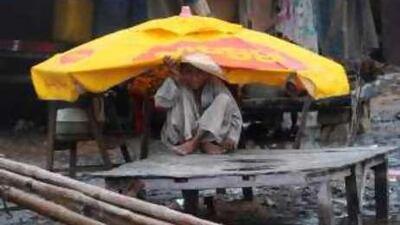ISLAMABAD // The Pakistani government on Saturday presented an austere budget for the financial year starting in July that reflected the fragility of the hugely indebted, under-developed country at war with insurgents. The bill tabled in parliament by the finance minister, Abdul-Hafeez Sheikh, at once aspired to the strict fiscal discipline demanded by international creditors, and sought to arrest a sharp decline in the standard of living.
However, tax reforms, key to broadening Pakistan's narrow revenue base, were deferred until October because of lingering differences between the federal and provincial governments over collection rights. Overall, the proposed budget envisioned expenditure of 3.26 trillion rupees (Dh140.73 billion), a year-on-year increase of 10.7 per cent, but sought to sharply reduce its budget deficit to 4 per cent by June 2011, from the current 5.1 per cent.
To meet those tough targets, the government is aiming at a 9.8 per cent increase in federal revenues by revoking all exemptions from payment of the collection of general sales tax, and invoking a standard 17 per cent rate in place of the previous 16 to 25 per cent band. The measures represent a transition towards the replacement of those taxes, described by Mr Sheikh as "ineffective for 20 years, and irrelevant because of sops exacted by lobbies", with a nationwide 15 per cent value-added tax (VAT) on all points on the profit chain.
The imposition of VAT is a prerequisite of the International Monetary Fund (IMF) for its continued support for Pakistan's struggling economy, to total US$11.33 billion (41.62 billion) by the end of a 23-month programme in December. The budget deficit had spiralled to 7.5 per cent and foreign exchange reserves were barely enough for a month's imports when the IMF stepped in at the fledgling democratic government's request in November 2008, following a year of violent political transition and the emergence of a direct threat to the state by the Tehrik-i-Taliban Pakistan militants.
The government also sought to tighten its belt, imposed a freeze on recurring federal government expenditure in the proposed budget. Mr Sheikh proposed a development budget of 663 billion rupees, the highest ever, only 2.6 per cent higher than what had originally been budgeted for the current financial year, ending June 30. It was slashed to just 250 billion rupees in January because of the mounting cost of the war against militants.
Mr Sheikh said 80 per cent of the the development budget would be dedicated to the completion of existing programmes, and that automatic quarterly fund releases would be instigated, to avoid undue political interference and corruption. Proposed spending on defence, ahead of a major operation against al Qa'eda and Afghan Taliban in North Waziristan, is projected at 442 billion rupees, or 17 per cent higher than what was spent this fiscal year.
The largest outlay of some 873 billion rupees would be consumed by payments on Pakistan's foreign debt, totalling $50.1 billion, or about 60 per cent of gross domestic product (GDP). The government is seeking to bring that down to below 50 per cent in the next three years. Mr Sheikh acknowledged the massive toll official austerity and insecurity-induced economic recession had taken on Pakistan's population, whose per capita income has fallen during a period of excessive consumer price inflation.
The government has struggled to contain inflation because of a 42 per cent slide in the value of the rupee to the US dollar since 2007, and the impact it has had on the prices of key imports such as fuel and food commodities. Core inflation has risen back above 12 per cent this year, after falling from 25 per cent in October 2008, the month before the IMF agreed to extend assistance to Pakistan, to 8.9 per cent a year later.
Pakistanis have been hit harder by the rapid phasing out of official subsidies on electricity, with the price paid by consumers rising by 66 per cent in the year-and-a-half up to April. The result is that Pakistanis have been forced to eat 10 per cent less bread, the national staple, than they did in 2003, Wolfgang Herbinger, the country head of the UN World Food Programme, told journalists in Islamabad on Wednesday.
Mr Sheikh responded to the growing poverty by proposing a 50 per cent pay-rise for junior civil servants, and increasing the exempted income of low-earning private sector employees and small businesses by the same proportion. He also doubled civil service medical allowances and proposed free family health insurance of 25,000 rupees per year for impoverished families. Funding of the Benazir Income Support Fund, a programme supported by the World Bank that has been particularly active in insurgency-hit regions, was raised by 40 per cent.
A year of successful counterattacks against the Taliban, considerable agricultural growth despite regional water shortages, and a gradual improvement in key export markets have led the Pakistani government and its creditors to conclude that the recession has bottomed out. Growth in GDP improved significantly in the current year to 4.1 per cent from 1.2 per cent. However, all stakeholders recognise that the recovery is "fragile" and that Pakistan's economy remains "vulnerable" to a wide range of potential shocks.
@Email:thussain@thenational.ae

